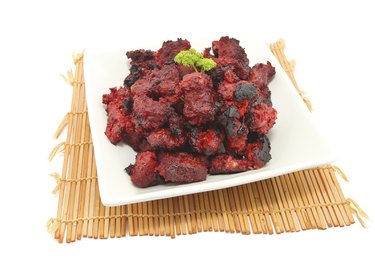
Red yeast rice naturally contains compounds similar to those found in statin drugs, which are commonly prescribed to treat high cholesterol. Statins can interfere with levels of Coenzyme Q10 (CoQ10), a nutrient vital for heart and muscle health. Low levels might also exacerbate certain symptoms associated with these treatments. Because of their similarity, some concern exists that red yeast rice could also alter CoQ10 levels, according to the University of Maryland Medical Center. Taking a supplement along with your red yeast rice treatment can prevent this problem. Some dosage guidelines have been suggested, but talk to your doctor about your appropriate dose.
Dose Guidelines
Video of the Day
A study published in the 2005 issue of ''Biofactors'' tested the effects of CoQ10 supplementation on subjects who had discontinued their statin drugs due to side effects. On average, subjects took 240 mg and they reported significant reductions in adverse reactions associated with statins, such as muscle pain and fatigue. The study noted an ''average'' dose of 240 mg, meaning the actual dose varied between participants. The University of Maryland Medical Center suggests a dose of 150 to 200 mg at night to prevent red-yeast-rice-related CoQ10 deficiency. Ultimately, your doctor can determine the most appropriate dose based on your individual circumstances. If you have already begun experiencing side effects related to low levels, you might require a different dose than someone who just started the supplement for prevention.
Video of the Day
Continuing CoQ10 after Stopping Red Yeast Rice
The effects of drugs and supplements can sometimes persist even after you stop taking them. The University of Maryland Medical Center recommends continuing CoQ10 supplements at its recommended dose for one month after you stop using red yeast rice.
Medication Interactions
CoQ10 might lower blood sugar levels, blood pressure and platelet counts. Because of these effects, MayoClinic.com states you might require dosage adjustments in insulin and other diabetes medications, antihypertensives and anticoagulants to compensate.
Other Considerations for Use
Talk to your doctor before using CoQ10 if you have liver disease or take medications that carry a risk of liver damage. MayoClinic.com reports one study which found CoQ10 altered thyroid levels. If you have any condition that affects your thyroid gland, discuss this with your doctor.